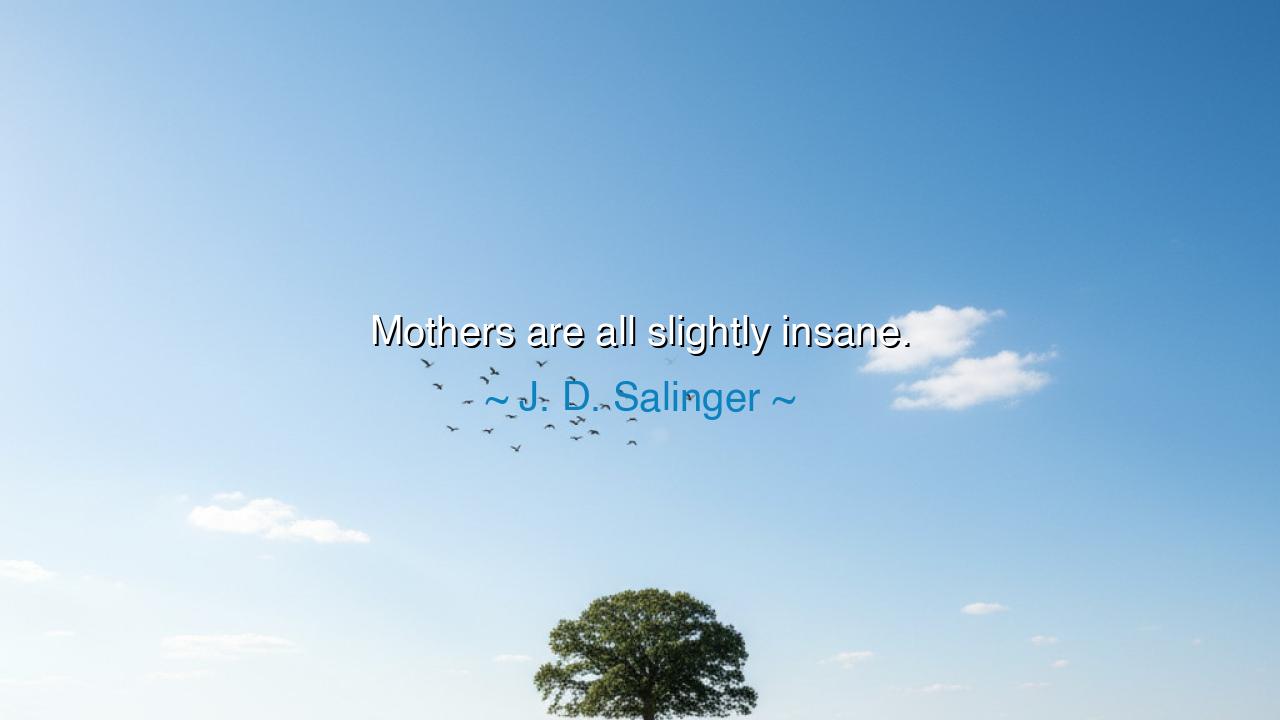
Mothers are all slightly insane.






In the curious and piercing words of J. D. Salinger, “Mothers are all slightly insane,” we hear not mockery, but a reverent confession. These words, though wrapped in humor, reveal a truth as old as humanity itself—the truth that motherhood, in its depth and devotion, exists beyond reason. To love a child is to surrender logic, to bear sleepless nights, endless worry, and boundless sacrifice, all for the sake of another life. The world may call such devotion madness, but in that madness lies a divine wisdom—the wisdom of love that refuses to measure, refuses to end.
Salinger, the reclusive author of The Catcher in the Rye, was a man who observed humanity with a sharp, unflinching eye. His words often carried the weight of contradiction, revealing tenderness through irony. The origin of this quote rests in his understanding of human nature—that those who love most deeply often walk closest to the edge of reason. The mother, by her very essence, lives in that delicate tension between strength and vulnerability. She carries her child not only in the body but forever in the mind, haunted by fears and dreams the child may never know. Salinger’s remark, though simple, recognizes the cost of that love—the gentle, enduring madness that comes from caring too much.
The ancients would not have found this strange. They spoke of love as a divine frenzy, a kind of sacred madness. The Greek philosopher Plato wrote that true love is a divine illness sent by the gods to lift the human soul beyond the ordinary. In this light, the mother’s “insanity” is not folly but transcendence. She loves beyond sense or measure, beyond what the mind can justify. She fears endlessly because her heart is bound to another’s fate. This is the holy unreason of the maternal spirit—the kind of love that moves mountains, defies nature, and even challenges the gods.
Consider the story of Monica of Hippo, the mother of Saint Augustine. Her son strayed far from the path of faith, embracing pleasure and pride, dismissing her warnings and tears. Yet Monica’s devotion was relentless. For years she prayed for him, wept for him, followed him across continents in her desperate hope that he might find redemption. People said she was foolish, even mad, for her persistence. But in the end, her love triumphed: Augustine was converted, and his writings would change the course of Christian thought. In Monica’s “insanity” was a faith that reason could never comprehend—a holy persistence, born of love.
When Salinger called mothers “slightly insane,” he spoke also of their contradictions—their laughter in the midst of exhaustion, their fierce protectiveness mingled with tenderness, their ability to forgive the unforgivable. The world calls it madness because it is rare, because it defies the selfishness that governs ordinary life. A mother’s heart is always a battlefield—between fear and courage, control and surrender. Yet it is precisely in that chaos that her greatness resides. She is the living embodiment of love unreasoned, of a devotion that is fierce, messy, and eternal.
There is a lesson here for all who listen. The world often seeks balance, rationality, and self-interest, but love—real love—requires a measure of madness. Whether in motherhood, friendship, or devotion to a cause, one must be willing to lose a little of oneself, to risk the safety of detachment for the fire of compassion. As Salinger’s words remind us, the human heart cannot be ruled entirely by reason, for it was made not merely to think, but to feel. The “slight insanity” of the mother is the model for a higher kind of humanity—the courage to love recklessly and completely, even in a world that may never understand.
Let this truth be handed down: sanity without love is emptiness, but love without limits is creation itself. To be “slightly insane” in one’s love is to be most alive—to care enough to weep, to hope enough to try again, to forgive when reason says to let go. So when you see a mother’s worry, her fierce protection, her endless patience, do not call her mad—call her sacred. For her madness is the heartbeat of the world, the divine pulse that keeps humanity from turning cold.
Thus, in J. D. Salinger’s deceptively simple words lies the oldest wisdom: that to love deeply is to lose a little of one’s mind, but to gain the whole of one’s soul. And if this is madness, then may the world never be cured.






AAdministratorAdministrator
Welcome, honored guests. Please leave a comment, we will respond soon